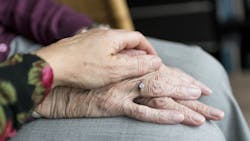CMS unveils enhanced enforcement actions for nursing homes based on data and inspections
The Centers for Medicare & Medicaid Services (CMS) unveiled enhanced enforcement for nursing homes with violations of longstanding infection control practices. This announcement builds on the previous actions CMS has taken to ensure the safety and security of America’s nursing homes as the nation battles coronavirus disease 2019 (COVID-19.
The enhanced and targeted accountability measures are based on early trends in the most recent data regarding incidence of COVID-19 in nursing homes, as well as data regarding the results of the agency’s targeted infection control inspections. CMS is increasing enforcement (e.g., civil money penalties (CMPs)) for facilities with persistent infection control violations, and imposing enforcement actions on lower level infection control deficiencies to ensure they are addressed with increased gravity.
The Coronavirus Aid, Relief, and Economic Security Act (CARES Act) provided additional funding to CMS for necessary survey and certification work related to COVID-19, of which $80 million in new resources will be available for states to increase surveys. To ensure effective oversight is achieved, CMS will allocate the CARES Act funding based on performance-based metrics.
States that have not completed 100 percent of focused infection control surveys of their nursing home by July 31, 2020 will be required to submit a corrective action plan to their CMS location outlining the strategy for completion of these surveys within 30 days. If, after the 30-day period, states have still not performed surveys in 100 percent of nursing homes, their CARES Act fiscal year 2021 allocation may be reduced by 10 percent. Subsequent 30-day extensions could result in an additional five percent reduction. These funds would then be redistributed to those states that completed 100 percent of their focused infection control surveys by July 31.
Utilizing the CARES Act funding, states will be required to perform on-site surveys of nursing homes with previous COVID-19 outbreaks and will be required to perform on-site surveys (within three to five days of identification) of any nursing home with new COVID-19 suspected and confirmed cases.
To help nursing homes implement infection control best practices, CMS will provide technical assistance through Quality Improvement Organizations (QIOs).
CMS and the Centers for Disease Control and Prevention (CDC) will continue to monitor the data it receives through the new nursing home COVID-19 surveillance system to identify nursing homes with outbreaks and work with Governor’s offices and states to keep nursing home residents safe.
Since April 19, 2020, CMS has required nursing homes to inform, residents, their families, and representatives of COVID-19 cases in their facilities. For the first time, nursing homes are required to report COVID-19 cases and deaths directly to the CDC on an ongoing basis as the result of an unprecedented CMS regulatory requirement issued on May 1, 2020.
The reporting requirement applies to long-term care facilities only (also known as skilled nursing facilities and nursing facilities, and generally as nursing homes). By law, CMS regulates and oversees nursing homes, which are certified to provide Medicare and/or Medicaid skilled nursing facility services. Therefore, the data does not include COVID-19 data from assisted living facilities, which are not regulated at the federal level.
As of May 24, 2020, about 12,500 nursing homes – approximately 80 percent of the 15,400 Medicare and Medicaid nursing homes – had reported the required data to the CDC. These facilities reported over 60,000 confirmed COVID-19 cases and almost 26,000 deaths.
Of the nursing homes that reported data, approximately one in four facilities had at least one COVID-19 case, and approximately one in five facilities had at least one COVID-19 related death. Early analysis shows that facilities with a one-star quality rating were more likely to have large numbers of COVID-19 cases than facilities with a five-star quality rating. CMS will take enforcement action against the nursing homes that have not reported data into the CDC as required under CMS participation requirements.
CMS will post the underlying CDC-collected data on a link on Nursing Home Compare so the public can view general information of how COVID-19 has impacted nursing homes in a user-friendly format. The data will be broken down by state, number of residents and number of staff. The data will be searchable by facility name and will be downloadable so researchers and other stakeholders can perform their own in-depth analysis. CMS will update the data weekly.
CMS will also post a link to the data on the home page of the Nursing Home Compare website so patients, residents, and families can easily find it. Nursing Home Compare is a valuable tool for patients, residents, and families to understand the quality of nursing homes and to support their healthcare decisions. Adding this information only increases its value and reinforces CMS’s commitment to transparency.
CMS is ratcheting up penalties for noncompliance with infection control to help prevent backsliding, improve accountability, and ensure prompt compliance. Since February 2020 CMS has provided over 13 guidance documents and facts sheets pertaining to infection control and conducted weekly calls with nursing homes to share best practices from the field. The enhanced enforcement actions will increase penalties for nursing homes have had past infection control deficiencies.
